#law management
Text
#case management#document management#lawyer#lawyer for bankruptcies#lawyer au#lawyer for car accident#lawyer firm#law management#documentation#case management software
2 notes
·
View notes
Text
Before taking on that student debt - look at the number of lawyers!
It has probably been the case for years, but I was really interested to read this article by Emily Hinkley in Legal Cheek: ‘Twice as many women as men apply to study law‘.
What interested me though wasn’t the fact that more women than men are applying to study law – that should be a given when you take on board that there are now more women than men in the profession (just don’t look at the…

View On WordPress
0 notes
Text
Time limits and being late for dinner
Danny, pinned down by gunfire on top of a wounded red hood who caught him in his territory and chased him into a rivals warehouse:
"Hey hood, soo... hypothetically, if I was to remove your helmet how long is the detonation trigger?"
Jason starting to lose conciousness and slur from blood loss:
"Like half a second after it triggers, it'll blow before you can clear my head, why?"
"Cool, that gives me half a second to see why my sister is obsessed with your ugly ass!"
"What? Wait... who's your sis-"
*grabs Jason's head by the helmet and phases it straight off and through his body using the momentum to throw it towards a group of shooters in a single move*
[There's a loud bang and the shooters duck for cover as two go down screaming from the shrapnel]
"-ter... hey! How'd you do that?"
"Ugh, I was right, you remind me of Johnnie. Oh well, c'mon man, well be late. Not something you want to experience when jazz is waiting"
"Jazz... Wait! Are you kidding me, the bookworm Jazz, is your sister?"
Danny braced his arms across hoods chest under the arms like they were floating in water and leaned backwards, red hood and himself suddenly unburdened by gravity slid through the wall covering their backs and disappeared from sight (if not sound as Jason dazedly kept commenting on the cute girl he'd mistaken for babs and if she actually liked him back)
They were late, jazz was definately gonna be mad!
#meeting the future brother in law#danny trying to shut jason up so the shooters dont follow them home:#“shh dude or I'll start hitting on your sisters as payback... actually theyre hot... i might do that anyway!”#*sudden vice like grip around throat* “-glk please let go. it was a joke... mostly!”#anger management ship#jazz x jason#dannys soo gonna hit on spoiler and black bat to get hood back#my writing#dcxdp#dpxdc
629 notes
·
View notes
Text

Swan Song: An illustrated poetry zine about Law and Doflamingo (by me!)
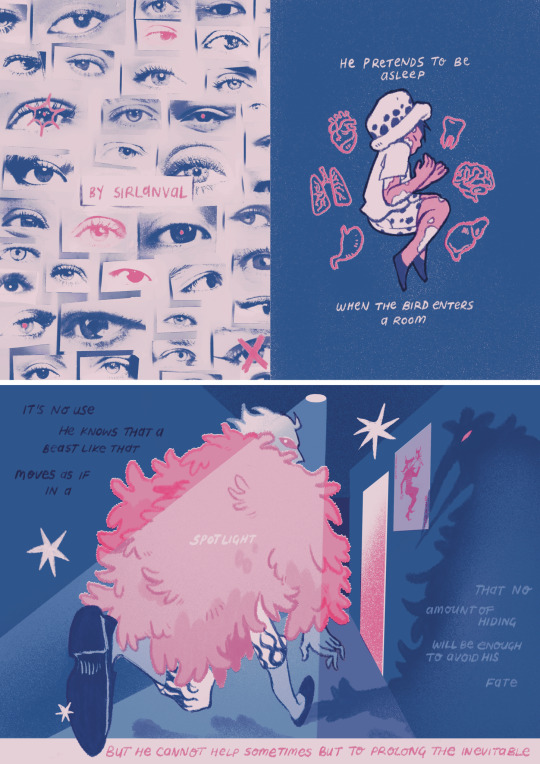
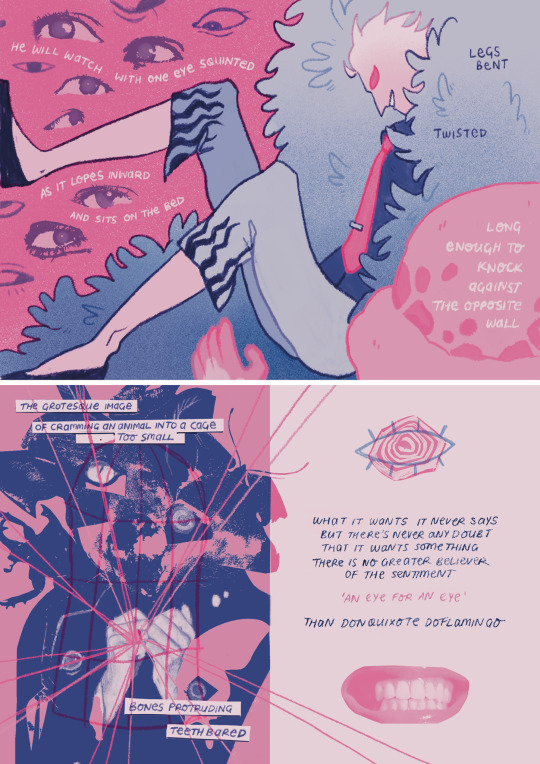
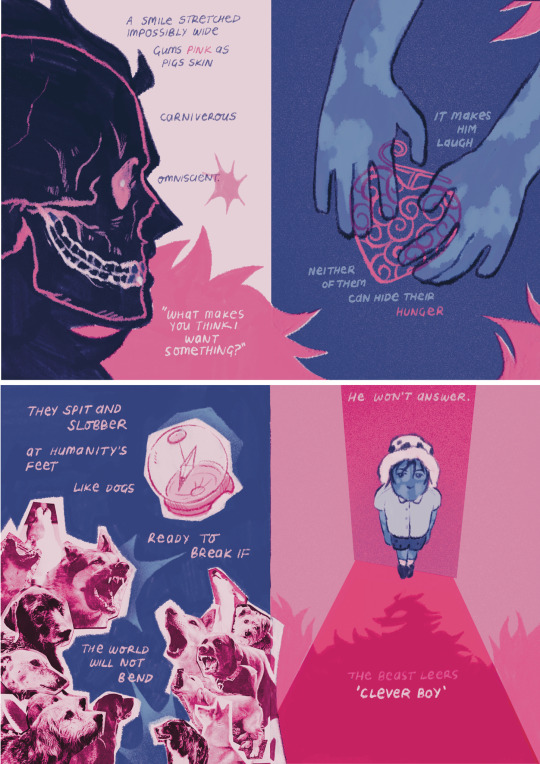
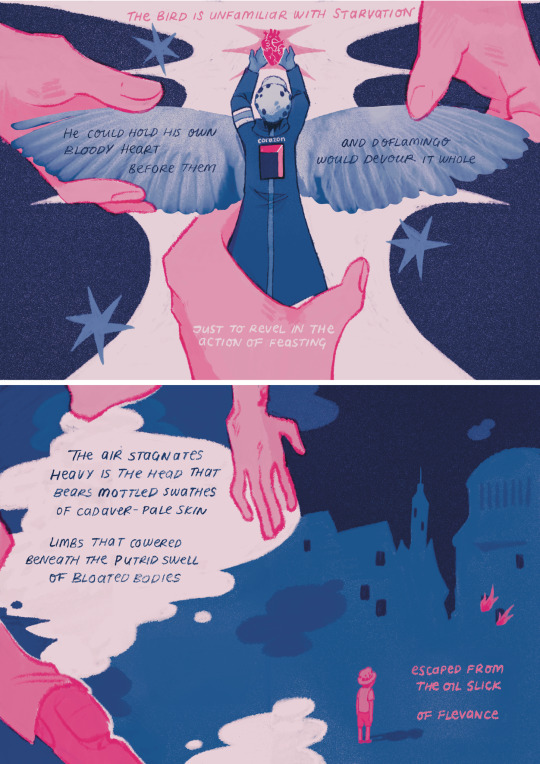
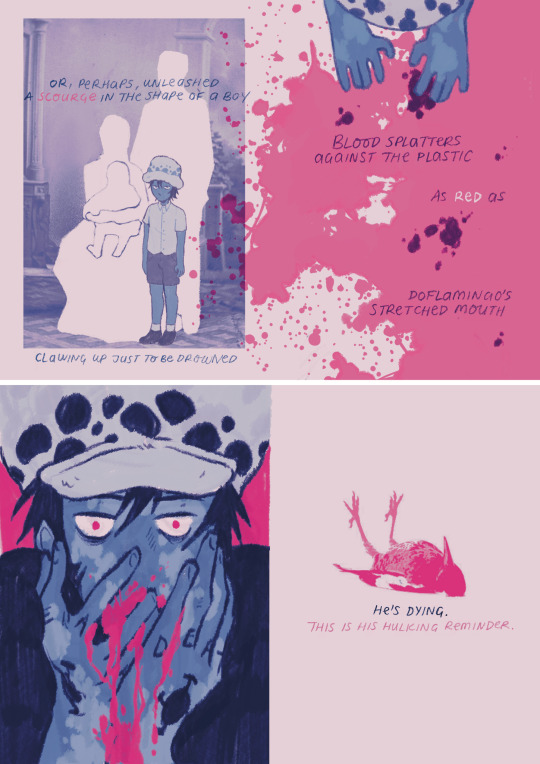
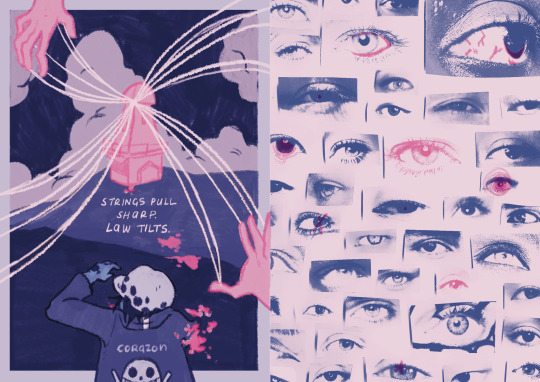
#this one’s been my baby for a while i’m very excited to share it#their dynamic really fascinates me#i am normal about law we all know this#also shout out to me for managing to make this entire zine without mentioning cora once#NOT SHIP#doflalaw shippers you will catch these hands#anyway#one piece#one piece art#trafalgar law#trafalgar d water law#donquixote doflamingo#my art#tw: blood#tw: death#tw: body horror
823 notes
·
View notes
Note
I just want you to know that I LIVE for the way you draw Law. Like, you capture his energy so well, I need to violently shake him like a chew toy
Anon, I am so glad you like how I draw him and that you think I capture his energy well! That's such a nice compliment.
Here, have a Law from my files for that:

#Anonymous#trafalgar law#trafalgar d water law#one piece#my art#bee replies#I haven't drawn fanart in forever because I barely managed to make myself draw for work and there was no energy left to do anything else#but he's still my go to guy to draw when I just want to play around
689 notes
·
View notes
Text
what do u do with ur time⋆.ೃ࿔*:・🪷

everyone has twenty-fours in a day. but why is it that some ppl end up getting more done, and what they get done has high ROI? this post will hopefully inform u about how important it is to seize ur time.
scheduling : i'll always advocate for scheduling ur time and organizing it into smaller chunks. its something that rly helped me when i was breaking habits of chronic procrastination. it kept me busy, and gave my time meaning.
there r endless scheduling tools like notion, the notes app, or even a physical agenda. i prefer online resources bcuz i always have my phone or computer on me so its more practical for my lifestyle.

before the start of every week (saturday or sunday) have a seat and plan out ur week. what do u need to get done? what would u like to enjoy? etc etc. doing so gives ur time purpose and meaning and if u stick to the agenda, you'll find that ur literally so productive!!
the objective is to make the MOST of ur time, with that being said evaluate what u do on a regular basis, what needs to be done for ur future, and determine what has the highest return on investment.
WHAT MAKES SOMETHING PRODUCTIVE : it says so in the word itself, productive. to produce. produce a feeling? a tangible outcome? i think thats up to you to decide. but if doing something provides you with anything positive i think it qualifies as productive. but being productive also comes with the pressure of ALWAYS being productive.
you need to also allow urself time to do NOTHING. ik it seems weird but i think that its the most productive of all. when i say nothing i dont mean scrolling mindlessly through ur phone. i mean separating urself completely from ur phone, from anything at all and just SIT with ur thoughts for some time. dont get distracted just be alone with ur thoughts. do absolutely nothing, dont distract urself by reading or looking out the window just sit there and think.
with all this being said i hope that u can give ur time value and that ur time will give back to you and set u up for success 💗💗💗💗
#self care#self love#becoming that girl#advice#that girl#it girl energy#it girl#self concept#law of assumption#manifesting#notion#self development#self improvement#self discipline#time management
825 notes
·
View notes
Text
Herbs to help you regulate cortisol and stress 🌿🍵🧚
🍃 Chamomile when you have an anxious stomach
🍃 Valerian when your thoughts don’t let you sleep
🍃 Skullcap when you feel muscle tension from stress
🍃 Holy basil when you’ve been high stress for days
🍃 Rhodiola when you feel burnt out from stress
🍃 Gotu kola when stress is causing you brain fog
🍃 Passion flower when you feel irritable and snappy
#herbs#plants and herbs#natural medicine#meditation#womens health#healthy lifestyle#health tips#health and wellness#healthylifestyle#cortisol#manage stress#hormones#hormonal balance#hormonal imbalance#healingjourney#healing#law of the universe#medicinal herbs#chinese herbs#natural herbs#herbsforhealth
339 notes
·
View notes
Text
Why none of my books are available on Audible (and why Amazon owes me $3,218.55)

I love audiobooks. When I was a high-school-aged page at a public library in the 1980s, I would pass endless hours shelving and repairing books while listening to “books on tape” from the library’s collection. By the time iTunes came along, I’d amassed a huge collection of cassette and CD audiobooks and I painstakingly ripped them to my collection.
Then came Audible, and I was in heaven — all the audiobooks, none of the hassle of ripping CDs. There was only one problem: the Digital Rights Management (DRM). You see, I’ve spent most of my adult life campaigning against DRM, because I think it’s an existential danger to all computer users — and because it’s a way for tech companies to hijack the relationship between creators and their audiences.
In 2011, I gave a speech at Berlin’s Chaos Communications Congress called “The Coming War on General Purpose Computing.” In it, I explained that Digital Rights Management was technologically incoherent, a bizarre fantasy in which untrusted users of computers could be given encrypted files and all the tools needed to decrypt them, but somehow be prevented from using those decrypted files in ways that conflicted with the preferences of the company that supplied those files.
As I said then, computers are stubbornly, inescapably “general purpose.” The only computer we know how to make — the Turing-complete von Neumann machine — is the computer that can run all the programs we know how to write. When someone claims to have built a computer-powered “appliance” — say, a smart speaker or (God help us all) a smart toaster — that can only run certain programs, what they mean is that they’ve designed a computer that can run every program, but which will refuse to run programs unless the manufacturer approves them.
But this is also technological nonsense. The program that checks to see whether other programs are approved by the manufacturer is also running on an untrusted adversary’s computer (with DRM, you are the manufacturer’s untrusted adversary). Because that overseer program is running on a computer you own, you can replace it, alter it, or subvert it, allowing you to run programs that the manufacturer doesn’t like. That would include (for example) a modified DRM program that unscrambles the manufacturer-supplied video, audio or text file and then, rather than throwing away the unscrambled copy when you’re done with it, saves it so you can open it with a program that doesn’t restrict you from sharing it.
As a technical matter, DRM can’t work. Once one person figures out how to patch a DRM program so that it saves the files it descrambles, they can share that knowledge (or a program they’ve written based on that knowledge) with everyone in the world, instantaneously, at the push of a button. Anyone who has that new program can save unscrambled copies of the files they’ve bought and share those, too.
DRM vendors hand-wave this away, saying things like “this just keeps honest users honest.” As Ed Felten once said, “Keeping honest users honest is like keeping tall users tall.”
In reality, DRM vendors know that technical countermeasures aren’t the bulwark against unauthorized reproduction of their files. They aren’t technology companies at all — they’re legal companies.
In 1998, Bill Clinton signed the Digital Millennium Copyright Act (DMCA) into law. This is a complex law and a decidedly mixed bag, but of all the impacts that the DMCA’s many clauses have had on the world, none have been so quietly, profoundly terrible as Section 1201, the “anti-circumvention” clause that protects DRM.
Under DMCA 1201, it is a felony to “traffick” in tools that bypass DRM. Doing so can land you in prison for five years and hit you with a fine of up to $500,000 (for a first offense). This clause is so broadly written that merely passing on factual information about bugs in a system with DRM can put you in hot water.
Here’s where we get to the existential risk to all computer users part. As a technology, DRM has to run as code that is beyond your observation and control. If there’s a program running on your computer or phone called “DRM” you can delete it, or go into your process manager and force-quit it. No one wants DRM. No one woke up this morning and said, “Dammit, I wish there was a way I could do less with the entertainment files I buy online.” DRM has to hide itself from you, or the first time it gets in your way, you’ll get rid of it.
The proliferation of DRM means that all the commercial operating systems now have a way to run programs that the owners of computers can’t observe or control. Anything that a technologist does to weaken that sneaky, hidden facility risks DMCA 1201 prosecution — and half a decade in prison.
That means that every device with DRM is designed to run programs you can’t see or kill, and no one is allowed to investigate these devices and warn you if they have defects that would allow malicious software to run in that deliberately obscured part of your computer, stealing your data and covertly operating your device’s sensors and actuators. This isn’t just about hacking your camera and microphone: remember, every computerized “appliance” is capable of running every program, which means that your car’s steering and brakes are at risk from malicious software, as are your medical implants and the smart thermostat in your home.
A device that is designed for sneaky code execution and is legally off-limits to independent auditing is bad. A world of those devices — devices we put inside our bodies and put our bodies inside of — is fucking terrifying.
DRM is bad news for our technological future, but it’s also terrible news for our commercial future. Because DMCA 1201 bans trafficking in circumvention devices under any circumstances, manufacturers who design their products with a thin skin of DRM around them can make using those products in the ways you prefer into a literal crime — what Jay Freeman calls “felony contempt of business model.”
The most obvious example of this is in the Right to Repair fight. Devices from tractors and cars to insulin pumps, wheelchairs and ventilators have been redesigned to use DRM to detect and block independent repair, even when the technician uses the manufacturer’s own parts. These devices are booby-trapped so that any “tampering” requires a new authorization code from the manufacturer, which is only given to the manufacturer’s own service technicians.
This allows manufacturers to gouge you on repair and parts, or to simply declare your device to be beyond repair and sell you a new one. Global, monopolistic corporations are drowning the planet in e-waste as a side-effect of their desire to block refurbished devices and parts from cutting into their sales of replacements:.
DRM laws like DMCA 1201 are now all over the world, spread by the US Trade Representative, who made DRM laws a condition of trading with the USA, and a feature of the WTO agreement. Whether you’re in South America, Australia, Europe, Canada, Japan, or even China, DRM-breaking tools are illegal. But remember: DRM is a technological fool’s errand. So while there is no above-ground, legal market for DRM-breaking tools, there is still a thriving underground for them.
For example, farmers all over the world replace the software on their John Deere tractors with software of rumored Ukrainian origin that floats around on the internet. This software lets them fix their tractors without having to wait days for a $200 visit from a John Deere technician, but no one knows what’s in the software, or who made it, or whether it has sneaky back-doors or other malicious code.
And yet, manufacturers keep putting DRM in their products. The prospect of making it a felony to displease your corporate shareholders is just too much to resist.
Which brings me back to Audible. Back before Amazon owned Audible, I bought thousands of dollars’ worth of Audible audiobooks, and they worked great — but they failed badly. When I switched operating systems and could no longer get an Audible playback program, I was in danger of losing my audibook investment. In the end, I had to rig up three old computers to play my Audible audiobooks out in real time and recapture them as plain old MP3s. It took weeks. If I’d made the switch a couple years later, it would have been months (the “audiobooks” folder on my current system has 281 days’ worth of audio!).
Amazon bought Audible during a brief interval in which the company was taking on DRM. They had just launched the Amazon MP3 store, as a rival to Apple’s iTunes Store, which sold music without DRM, so users wouldn’t be locked to Apple’s platform. This was a problem the music industry had just woken up to, after years of demanding DRM, they realized that nearly all the digital music they’d ever sold was locked to Apple’s platform, and that meant that Apple got to decide whether and how their catalog was sold.
Amazon’s MP3 store’s slogan was “DRM: Don’t Restrict Me.” They even sent me a free t-shirt to promote the launch, because they knew my feelings on DRM.
When Amazon announced its Audible acquisition, they promised that they would remove DRM from the Audible store, and I rejoiced. Then, after the acquisition…nothing. Not a word about DRM. The Amazon PR people who’d once enthusiastically pitched me on Amazon’s DRM-free virtue stopped answering my email.
When I got new PR pitches from Amazon, I’d reply by asking about DRM and I’d never hear from those PR people again. I got invited to give a talk at Amazon and I said sure, I’d do it for free — but I wanted to talk to someone from Audible about DRM. The invitation was rescinded.
Once on a book-tour, I gave a talk at Goodreads — another Amazon division — about my work and when they asked if I had any questions for them, I raised Audible’s DRM and the senior managers in the audience promised to look into it. I never heard from them again.
Today, Audible dominates the audiobook market. In some verticals, their market-share is over 90 percent! And Audible will not let authors or publishers opt out of DRM. If you want to publish an audiobook with Audible, you must let them add their DRM to it. That means that every time one of your readers buys one of your books, they’re locking themselves further into Audible. If you sell a million bucks’ worth of audiobooks on Audible, that’s a million bucks your readers have to forfeit to follow you to a rival platform.
As a rightsholder, I can’t authorize my users to strip off Audible’s DRM and switch to a competitor. I can’t even find out which of my readers bought my books from Audible and send them a download code for a free MP3. Even when I invest tens of thousands of dollars of my own money to hire professional narrators to record my audiobooks, if I sell them on Audible, they get the final say in how my readers use the product I paid to create. If I provide my readers with a tool to unwrap Audible’s DRM from my copyrighted books, I become a copyright infringer! I violate Section 1201 of the DMCA and I can go to prison for five years and face a $500,000 fine. For a first offense.
All of this is so glaringly terrible that it prompted me to coin Doctorow’s First Law:
“Any time someone puts a lock on something that belongs to you, but won’t give you the key, that lock is not there for your benefit.”
It’s been more than a decade since Amazon bought Audible and it’s clear that their DRM policy isn’t going anywhere.
Which is why none of my audiobooks are available on Audible.
I don’t want to contribute to the DRM-ification of our devices, turning them into a vast, unauditable attack-surface that is designed to run programs that we can’t see or terminate. I don’t want my work to be a lure into a DRM-poisoned platform. I don’t want to make myself beholden to Amazon, locking my customers to its platform with every sale.
This doesn’t mean I don’t have audiobooks — I do! Early on, I worked with great audiobook publishers like Random House and Blackstone and Macmillan to produce DRM-free audiobooks which were sold everywhere except Audible. But Audible has the vast majority of the market, and it just didn’t make financial sense for these publishers to pay me a decent sum for my audio rights and then pay great narrators and engineers to produce books.
So I started retaining my audio rights in my book deals, and paying to record my own audiobooks. The first one was Information Doesn’t Want to Be Free, recorded by @wilwheaton, with introductions by @neil-gaiman and Amanda Palmer, which explains Doctorow’s First Law in detail.
Since then, I’ve produced many more independent audiobooks, including the audio for Homeland (the bestselling sequel to my YA novel Little Brother, also narrated by Wil), Walkaway (a fabulous multi-cast audiobook starring Amber Benson, Wil Wheaton, Amanda Palmer, Miron Willis, Gabrielle de Cuir and others), and Attack Surface (the third Little Brother book, narrated by Amber Benson).
Generally, these books recoup and make a little money besides, but not nearly so much as I’d make if I sold through Audible. My agent tells me that if I’d been willing to set aside my ethics and allow Audible to slap DRM on my books, I’d have made enough money to pay off my mortgage and save enough to pay for my kid’s entire college education.
That’s a price I’m willing to pay. In the years since the Amazon acquisition, Audible has become the 800-pound gorilla of audiobooks. They have done all kinds of underhanded things — like buying up the first couple books in a series and releasing them as Audible-only recordings, then refusing to record the rest of the series, orphaning it. They’re also notorious among narrators for squeezing their hourly rates lower than anyone else. Audible also refuses to sell into libraries, so all the “Audible Original” titles are blocked from our public library systems.
I think audiences get that there’s something really wrong with a system where a single company controls an entire literary format. In 2020, I Kickstarted the independent audiobook of Attack Surface and broke every record for audiobook crowdfunding, raising $276,000.
But Audible continues to dominate. It is the only digital audiobook channel Amazon will allow, so anyone who searches Amazon for a book will only see the Audible audio edition. It’s also the exclusive audio partner for Apple’s iTunes/Apple Books channel, which is the only iOS audiobook store that doesn’t have to pay Apple a 30 percent commission on all its sales, so it’s the only audiobook store that lets you actually buy new audiobooks.
Other audiobook stores require you to buy your books with a web-browser (which avoids Apple’s sky-high commissions) and then switch back to the app to download them — a clunky experience that has ensured that Apple’s own audiobook channel — with its mandatory DRM — is the only one iOS customers really use.
Not surprisingly, a lot of people assume that if an Audible search for an author or book comes up empty, that means there is no audiobook available. They don’t think of searching for the book on Google Books, or Libro.fm, or Downpour. They never think to check to see whether the author maintains their own storefront, as I do, where you can get all their ebooks and audiobooks without DRM.
That’s bad enough, but it gets worse. So much worse.
Audible has a side-hustle called ACX: it’s a “self-serve” platform where writers and narrators can team up to self-produce their own audiobooks, which are locked to Audible’s platform and encumbered with Audible’s DRM.
ACX has some nominal checks to ensure that the audiobooks that land on its platform are duly licensed from the rightsholders, but these are trivial to circumvent. Here’s how I know that: on multiple occasions, I’ve discovered that my own books have been turned into unauthorized audiobooks over ACX.
Scammers claiming to have the rights to my books commission narrators to record them on the cheap, with the promise of a royalty split when they are live. Inexperienced narrators, excited at the prospect of recording a major book by a bestselling author, put long, grueling hours into recording them. Then the book goes live, and I discover it, and have it taken down. The scammer disappears with the profits from the sales in the interim, and the narrator is screwed.
As am I.
Because these illegal ACX audiobooks compete with my own, self-produced editions, for which I pay narrators, directors and editors a fair wage for their creative labor. These unauthorized ACX audiobooks show up in searches for my name on Audible and Amazon, where my own (vastly superior, authorized) DRM-free audiobooks are not allowed.
This isn’t an isolated incident. It’s happened over and over again. It just happened again.
Last week, I heard from Shawn Hartel, a narrator who got scammed on ACX by someone calling themself “Barbara M. Rushing,” who told Hartel that they held the audio rights to my 2017 novel Walkaway. They do not have those rights.
I spent about $50,000 recording a stupendous audiobook edition of Walkaway, which you can buy here for $24.95.
This audiobook has met with widespread critical acclaim and the print edition has been translated and celebrated around the world. But Hartel didn’t know that.
On January 11, 2021, he accepted an offer from “Barbara M. Rushing” to record the book and worked long hours to produce a 16-hour narration. On February 1, 2021, the book was accepted by Rushing. On July 7, 2021, ACX listed Walkaway for sale. On November 9, 2021, ACX took the book down, having figured out that it was infringing.
In the meantime, Rushing sold 119 copies and gave away ten more, diverting people from buying my own, DRM-free edition.
129 times $24.95 is $3,218.55, and as far as I’m concerned, that’s what Amazon owes me.
Now, I’m not going to sue them (probably). I don’t have the money or time to fight that kind of battle. For one thing, I have eight books (four novels, a YA graphic novel, a short story collection and two nonfiction books) in various stages of production right now, and I’m going to be producing my own audio editions for them, which is going to suck up a lot of time.
But Amazon does owe me $3,218.55.
I don’t expect they’ll pay it.
Anyone who’s paid attention to Audiblegate knows about Amazon’s dirty ACX dealing. The company has been credibly accused of more than $100 million in wage-theft from ACX authors and narrators, whom it has scammed with a combination of a one-sided refunds policy and out-and-out accounting fraud.
I know a lot about Audiblegate because there’s a whole chapter about it in Chokepoint Capitalism: How Big Tech and Big Content Captured Creative Labor Markets and How We’ll Win Them Back, the book on creative labor markets that Rebecca Giblin and I wrote for Beacon Press:
Chokepoint Capitalism explains how large media and tech companies have cornered the markets for creative labor, and why giving creators more copyright won’t unrig this rigged game. The tech and entertainment giants are like bullies at the school gate who shake down creators for their lunch money every day.
To reach your audience you have to go through the chokepoints they have erected, and when you do, any additional copyright powers Congress has granted you is taken away as a condition of entry (think of how Audible nonconsensually takes away your right to use DRM law if you want to list your audiobooks).
If you give your bullied kid more lunch money, you won’t buy them lunch — you’ll just make the bullies at the school-gate richer. Giving creators more copyright inevitably results in those copyrights being transferred to Amazon and other monopolists. To get lunch for your kid — or justice for creators — you have to get rid of the chokepoints.
That’s what Chokepoint Capitalism is really about — not just how the markets got rigged, but how to fix them, with a list of shovel-ready, practical actions for local governments, national legislatures, artists’ groups, as well as creators, technologists and audiences.
We’re going to be rolling out a crowdfunding campaign for the Chokepoint Capitalism audiobook in a couple of weeks (the book comes out in mid-September). We’ve scored an incredible narrator, Stefans Rudnicki, who you may have heard on the Ender’s Game books, Hubris by Michael Isikoff and David Corn, or any of 1,000 other audiobooks. Stefan’s won a Stoker, a Bradbury, dozens of Audies and Earphones, two Grammys, and two Hugos. It’s gonna be fucking great.
And it won’t be available on Audible. Who owe me $3,218.55.
But you know what will*be available on Audible?
This. This essay, which I am about to record as an audiobook, to be mastered by my brilliant sound engineer John Taylor Williams, and will thereafter upload to ACX as a self-published, free audiobook.
Perhaps you aren’t reading these words off your screen. Perhaps you are an Audible customer who searched for my books and only found this odd, short audiobook entitled: “Why none of my books are available on Audible: And why Amazon owes me $3,218.55.”
I send you greetings, fellow audiobook listener!
I invite you to buy all my audiobooks at prices lower than Amazon’s, free from DRM and unencumbered by comedy-of-the-absurd “user agreements” that no one in their right mind would ever*agree to. They are for sale at craphound.com/shop.
Among those audiobooks, the $15 edition of Information Doesn’t Want to Be Free, where I explain not just Doctorow’s First Law, but also my Second and Third Laws (my agent was Arthur C. Clarke’s agent; when I told him I had come up with “Doctorow’s Law,” he told me that I needed three laws). As noted, this is superbly read by Wil Wheaton, and Neil Gaiman and Amanda Palmer read their own intros:
Of course, you will only find this book if Amazon ACX accepts it. I’ve combed quite carefully through their terms of service and I don’t see anything that would disqualify this from being listed as an ACX book.
But then again, they say they ban books produced without permission from the copyright holder and we’ve seen how that works out, right? From poking around on ACX, it looks like Amazon’s main way of checking whether a user has the rights to a book is by looking in Amazon’s catalog to see if there’s already an audiobook edition. That means that if a writer refuses to sell on Audible because of their DRM policies, Audible will use that boycott as an excuse to let ripoff artists bilk the writer, the narrator and the listeners — because if there’s no Audible edition, they assume that the audio rights must be up for grabs.
Will Audible let me use its platform to give away a book that criticizes Audible? Or will they exercise their overwhelming market power to both abet a $3,218.55 ripoff and suppress a critique of their role in that ripoff?
Only time will tell.
#

[Image ID: A screengrab of the ACX page for the audiobook, showing that it is 'pending audio review]
Addendum: I wrote the above on July 4, 2022, just before submitting the audiobook to Amazon and leaving for a holiday. Over the past two weeks, I've checked in with ACX daily, but the audiobook still shows as "Pending Audio Review." ACX advises that this process should take a maximum of ten business days. It's been 15. Perhaps they're very backlogged.
Or maybe they're hoping that if they delay the process long enough, I'll give up.
In the meantime, there is now a Kindle edition of this text:
https://www.amazon.com/dp/B0B5RWTPR7/
I had to put this up, it's a prerequisite for posting the audio to ACX. I hadn't planned on posting it, but since they made me, I did.

[Image ID: A screengrab of the Kindle listing page for my ebook showing it as the number one new release in antitrust.]
Bizarrely, this is currently the number one new Amazon book on Antitrust Law!
Also bizarrely - given the context - this book was taken down for several days due to a spurious copyright issue over the cover art, a cack-handed collage of some Creative Commons icons I put together with The GIMP. Amazon flagged this as a copyright violation (despite correct Creative Commons attribution) and took the book down, demanding that I change the cover art, ignoring my explanations. I was ultimately able to get the book restored by contacting someone I know at Amazon legal, who intervened.
I don't know if Amazon will ever release my audiobook, but I hope they do. In the meantime, you can listen to the audiobook of this essay for free via my podcast:
https://archive.org/download/Cory_Doctorow_Podcast_431/Cory_Doctorow_Podcast_431_-_Why_none_of_my_books_are_available_on_Audible.mp3
#
ETA: Within a few hours of my publishing this thread, ACX released my audiobook. https://audible.com/pd/B0B7KH8KSD
Image: Paris 16 (modified)/CC BY-SA 4.0; Dmitry Baranovskiy (modified) CC BY 4.0
[Image ID: An anti-pickpocketing graphic featuring a stick figure reaching into an adjacent stick-figure's shoulder-bag. The robber's chest is emblazoned with an Amazon 'a' logo. The victim's chest is emblazoned with an icon of a fountain-pen. The robber's face has an Amazon 'smile' logo. The victim's face has an inverted Amazon 'smile' logo (and is thus frowning). Beneath these two figures is a wordmark reading 'Audible: Am Amazon Company.']
#audible#amazon#amazongate#creator economy#ripoffs#drm#digital rights management#audiobooks#books#publishing#writing#monopoly#doctorow's first law#pluralistic
6K notes
·
View notes
Text

who's pulling the strings of the puppet king?
#lies of p#lies of p romeo#king of puppets#lies of p geppetto#fanart#digital art#hi hello do you think romeo was fully conscious when geppetto enacted law zero (?through him?).#i think about these two a lot... i don't tend to jump straight to the 'deal with the devil' part because there's something about--#--two people with nothing in common but the empty space between them. world's worst grief bonding situation!!!#and there's something a lot more compelling about that to me. and that's not even mentioning the grand covenant in the room--#merits its own post or something else. (because i think about it more than anything ever.)#tl;dr i would kill carlo myself if i got to witness them having the most painfully unpleasant conversation ever had by two people.#anyway i should comment on art process too huh.#the gist of it is if no one got me i know red and black got me.#it's my Old Reliable. i've been nearly gnawing my hands off from. not managing to get anything done in a way i liked so i went back.#i feel better now.... :-)#anyway. worst in-laws ever <3
355 notes
·
View notes
Text
Story Idea:
22 year old Gotham University student Danny finds a Damien clone whose near death and saves his life, offering to let the kid stay with him in his crappy apartment. The clone accepts, thinking Danny seems like a tolerable chump to bide his time with as he builds his strength for another fight with his progenitor for his rightful place as heir to Batman. Danny absolutely 100% knows the kid’s a clone and that taps right into his childhood trauma, making him want to protect him all the more. (Up to you if Dani is alive but in my version she’s not). Over time, Clone!Damien becomes begrudgingly fond of his new caretaker, especially after Danny starts taking him on Doctor Who style adventures through time/space and the tamer parts of the GZ (there are none) as part of his efforts to build up the kid’s confidence (outside his overcompensating ego) and help him learn to grow into his own person.
Bonus!
Danny and Clone!Damien are the downstairs neighbors to none other than Jason Peters (aka Jason Todd). They both clock him as Red Hood pretty quickly, but it takes much longer for them to connect him to the Waynes, so he’s kinda just their marginally more normal neighbor who happens to be a crime lord and who, for some reason, tends to check up on them a lot. (Originally this was because RH thought Danny might be an upcoming villain, then because he didn’t understand how Danny was alive, and then Clone!Damien moved in and he started checking to make sure that he didn’t murder Danny in his sleep). Luckily, Jason is a fantastic cook, so they are both grateful (to varying degrees) for his nosiness. (Is this a Dead on Main situation, are they just good friends? Who’s to say? You. Or me. But probably you.)
#danny phantom#dp x dc#damien wayne#jason todd#dc x dp#dead on main#dani phantom#potentially#Damien’s clone who has yet to pick a name#throughout this Danny dresses suspiciously like a supervillain#he’s got the wild hair goggles a sleeveless lab coat big ol’ boots too big for his feet#he makes a modest income off a handful of patents and is attending the university under scholarship#(it’s the Wayne secret anti villain scholarship that they use to monitor possible enemies/allies and help them before they go dark)#Jason has no idea how Danny managed to buy the apartment below his considering that he owns the whole thing and wasn’t looking for renters#he just appeared one day with moving boxes and all the proper paperwork#apparently he exploited some old as balls property laws to get his hands on the place#which is honestly sad#Jason has much better apartment buildings he could have gone for#the plants are a nice touch though#really liven up the place#almost cover up that lingering stench of death
459 notes
·
View notes
Text
When the chip readers for credit cards first started rolling out at the place I worked, there was a glitch where if the customer took the card out before it was done, the entire register system would freeze. I always, ALWAYS, told the customers “Put your chip in and don’t take it out until you hear the machine beep, otherwise it could freeze the system and we will have to start the transaction over/wait/etc.” We also only had three check-out registers, and two customer service registers.
Gentleman comes up to purchase his electronic. Puts chip in. I explain the way I always do. He takes the card out before it’s done. System freeze. He apologizes, and I reiterate that if he takes his card out before it’s fine the system will freeze. We move to another register while the first one reboots. He puts his card in. I tell him again not to take it out till it beeps. Again, he takes it out before. Second register is now frozen and has to reboot. When we moved to the third register, I asked him to hand me the card so I could perform the transaction myself. Idk if he was being malicious with his incompetence but he got REALLY pissy when I told him not to touch his card and that I would take it out for him. He asked for a manager. When the manager came over he literally told the customer “You’ve cause two registers to be down because you didn’t listen to instructions. I’m sorry but what else did you expect?”
One of the rare moments where management took my side.
#call center problems#fuck coworkers#fuck customers#fuck retail#happy ending#trigger warning#embarrassing#fuck co-workers#retail justice#retail law#submissions#tw:#server problems#fuck managers#cashier problems#tw
305 notes
·
View notes
Text
#case management#case management software#document management#documentation#law management#lawyer#lawyer au#lawyer firm#lawyer for bankruptcies#lawyer for car accident
0 notes
Text
Jazz, to Dan, Danny and Elle after they all move to Gotham to start their new lives: Okay, house rules!
Pointing at Danny: Don't add to the population.
Pointing at Dan: Don't subtract from the population.
Pointing at Elle: Don't end up in the hospital, newspaper or jail.
To all of them: If you end up in jail, establish dominance quickly.
*A Few Years Later*
Jazz, being rushed out of Gotham PD to the hospital because her water broke while she was in custody after killing the Joker - partially in self defense, partially out of revenge for her boyfriend Jason - in front of a bunch of reporters: Don't.
Elle, never caught for any of the shenanigans she got up to: ...
Dan, pillar of their local community that runs a soup kitchen and is in nursing school: ...
Danny, discovered his pansexuality and has been dating Tim ever since: ...
Danny: Did you at least establish dominance quickly?
#dc x dp#dp x dc#danny phantom#batman#jazz fenton#danny fenton#danielle fenton#danielle phantom#dani phantom#jason todd#anger management#anger management ship#dp x dc crossover#dp x dc anger management#this idea would not leave me alone 😂#Jazz: i have made strict house rules to keep you guys in line#also Jazz: i have broken every house rule and several laws#she will never live any of this down ever#brain dead#dead tired
971 notes
·
View notes
Text
My friend is watching op for the first time and is at Sabaody rn so obviously I’m like WHAT DO YOU THINK OF LAW and he was like “oh is that the funny little backstreet boy”



BECAUSE HES RIGHT

#penguin and shachi do backup vox#and Bepo is their manager#what is with Oda and giving people the worst fucking hats and then insisting they wear them for hundreds of episodes#my poor little nerdy guy he didn’t deserve that hat#trafalgar law#trafalgar d water law#trafalgar d Law#one piece
168 notes
·
View notes
Text
please pray for my grandad-in-law in the coming months, it’s suspected he has cancer in his lymph nodes and there’s a plan for surgery but he also has pretty severe heart failure so general anesthetic is risky.
#both zach and grandma-in-law have an anxiety thing going where ever since he got sick#it’s just ‘oh the Inevitable is finally here’#Zach i’ve managed to convince to at least try to push back panic with ‘I don’t know the outcome I will go forward acknowledging that#the worst could happen but also knowing that it also might not’#but his grandma is a wreck and I know it’s gonna get worse as we get closer to all the big stuff#please especially pray for peace in their family because let’s just say there’s some stuff that needs to be in order#and some silly conflicts they need to settle#prayer request
171 notes
·
View notes
Text
A handful more things from the Milo Mikey Murphy's Law pitch bible:



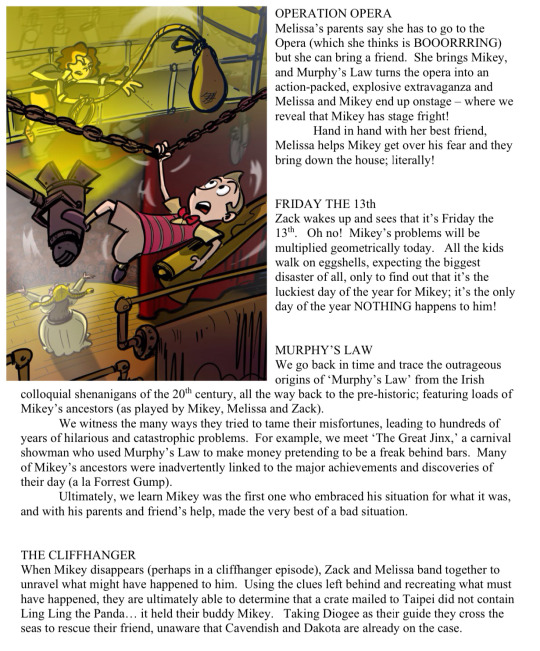


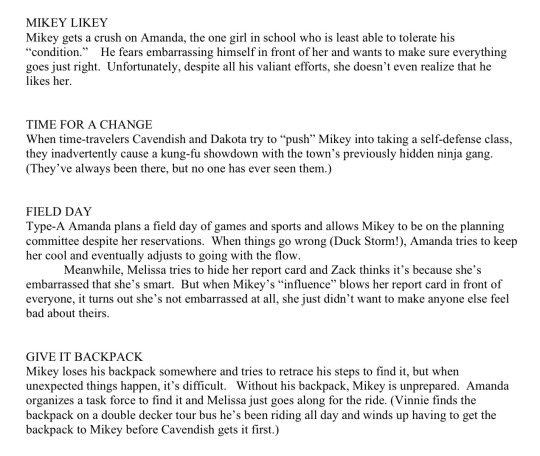
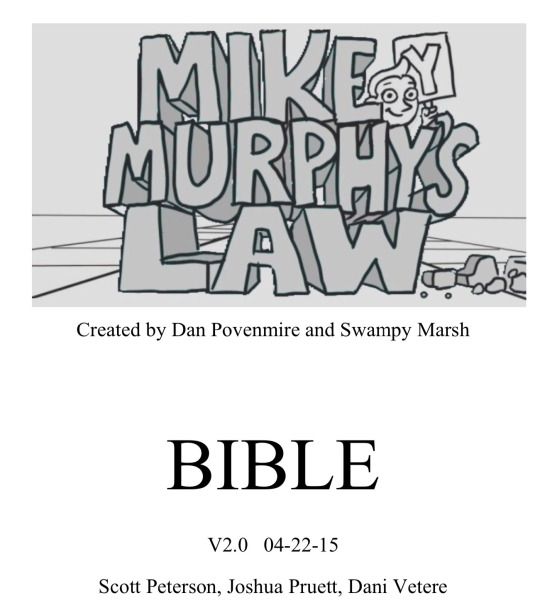
#via 4chan#milo murphy's law#milo murphy#zack underwood#melissa chase#diogee#brigette murphy#amanda lopez#martin murphy#sara murphy#balthazar cavendish#vinnie dakota#rooting for the enemy#sunny side up#battle of the bands#managing murphy's law#time out#first impressions#the doctor zone files#the undergrounders#smooth opera-tor#missing milo#we're going to the zoo#worked day#family vacation#school dance#milo murphy's halloween scream-a-torium#the island of lost dakotas#milanda
143 notes
·
View notes